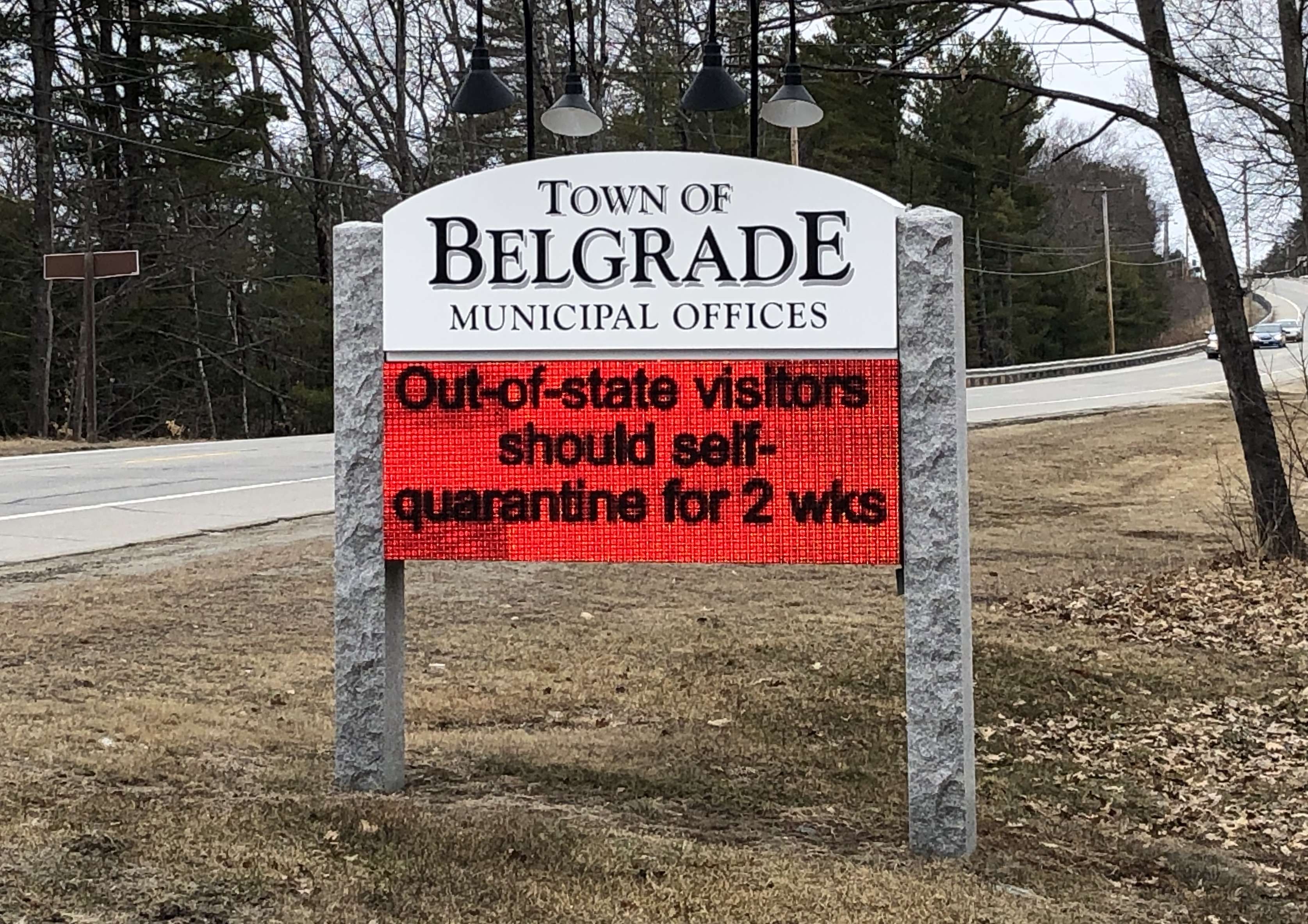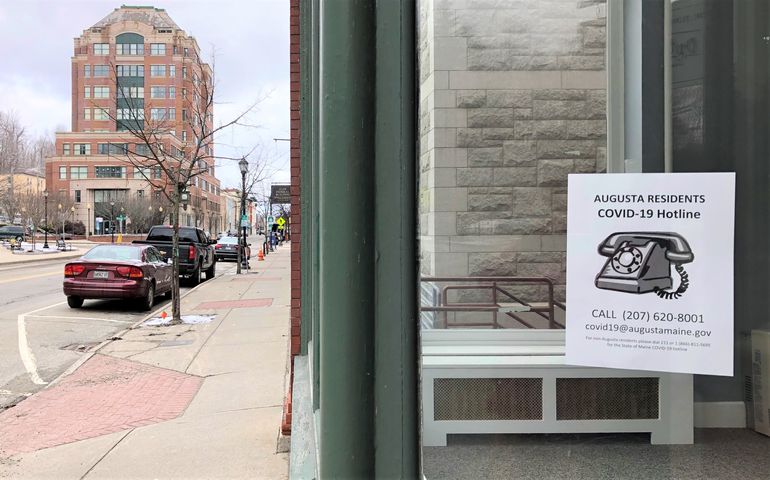
Processing Your Payment
Please do not leave this page until complete. This can take a few moments.
- News
-
Editions
View Digital Editions
Biweekly Issues
- December 1, 2025
- Nov. 17, 2025
- November 03, 2025
- October 20, 2025
- October 6, 2025
- September 22, 2025
- + More
Special Editions
- Lists
- Viewpoints
-
Our Events
Event Info
Award Honorees
- Calendar
- Biz Marketplace
Mills orders residents to stay home, tightens essential business restrictions
 Photo / Maureen Milliken
Maine CDC headquarters in downtown Augusta, left. The state's residents are navigating new restrictions as the COVID-19 pandemic spreads.
Photo / Maureen Milliken
Maine CDC headquarters in downtown Augusta, left. The state's residents are navigating new restrictions as the COVID-19 pandemic spreads.
More Information
As the COVID-19 pandemic spreads in Maine, Gov. Janet Mills on Tuesday issued new mandates, ordering residents to stay at home and increasing restrictions on essential businesses.
The Stay Healthy at Home directive announced at an afternoon news conference limits people living in Maine to go out only for an essential job or essential personal reason. The order pre-empts any local ordinance or emergency order of the same subject matter that is less restrictive or inconsistent.
The order also requires essential businesses and operations that remain open to limit the number of customers in a building and calls for curb-side pickup and delivery options as much as possible. Those businesses must enforce federal guidelines for physical distancing with their customers and employees on their property, including outside, she said.
The order begins at 12:01 a.m. Thursday and is in effect until end of the day on April 30, but may be extended. The state, as of Tuesday, had 303 confirmed cases of the coronavirus and five deaths, Dr. Nirav Shah, director of Maine CDC said at a news conference earlier in the day.
“We are in the midst of one of the greatest public health crises this world has seen in more than a century," Mills said Tuesday. "This virus will continue to sicken people across our state; our cases will only grow, and more people will die. I say this to be direct, to be as honest with you as I can. Because saving lives will depend on us."
'Day-to-day, hour-to-hour'
At least 30 states and the District of Columbia have issued such orders and there's growing pressure to clamp down, with federal estimates that a best-case scenario could still lead to 100,000 or more deaths across the U.S. In answer to reporters' questions, Mills said the order did not come from pressure outside of Maine to take stricter measures.
She said that state officials are making decisions relating to the health crisis "day-to-day, hour-to-hour."
"Today it seemed like the right thing to do, the right time," she said. While she's been impressed by the level of compliance in the state, she said, "it seems necessary to turn this into an order to make sure people comply."
While firm, and at times terse, during the news conference, she underlined the enormity of the situation as the conference ended.
"Nothing really feels right about doing this," she said. "Nothing feels normal. I don't think any of the governors I've spoken with or dealt with ever expected to have to take these kind of measures when they ran for governor, when they became governor. No one anticipated these kinds of measures."
She concluded in the same tone she and Shah have taken in the past few weeks, stressing community and empathy. "I beg the people of Maine to be patient, to be tolerant, to act with kindness, compassion and humanity to your neighbors, your families, your friends and your community members across the state as we engage in this unusual manner to put to bed this dangerous, terrible, deadly virus."
Essential business mandates
Essential businesses — those that are deemed necessary by U.S. Homeland Security guidelines — now have strict restrictions, rather than recommendations, to comply with.
Retailers must enforce a 6-foot separation between any customers waiting in lines. Any essential business that violates the order will be subject to further on-site restrictions or will be closed until those violations are addressed.
Stores are also required to conduct as much business as possible by curbside order and pick-up or delivery to limit in-person contact, and enforce physical distancing in and around their building by prominently posting signs at public entrances and on the floor to notify customers to stay 6 feet apart.
They must also disinfect the handles of every cart and basket between uses, minimize the amount of unpurchased merchandise customers can handle and offer separate operating hours for people over the age of 60 and those with underlying medical conditions.
Mandated limits to customers in stores are:
- Less than 7,500 square feet, must limit the number of customers in the store at one time to five. Examples include gas stations and convenience and specialty food stores.
- More than 7,500 and less than 25,000 square feet, limit the number of customers to 15. Examples include stand-alone pharmacies and certain hardware stores.
- More than 25,000 and less than 50,000 square feet, limit the number of customers to 50. Examples include mid-sized and locally owned grocery stores.
- More than 50,000 and less than 75,000 square feet, limit the number of customers to 75. Examples include chain grocery stores.
- More than 75,000 square feet, limit the number of customers in the store at one time to 100 and install protective shields between customers and checkout clerks as soon as is practical. Examples of such stores include Lowe’s, Walmart, Target and Home Depot.
Stay at home, transportation restrictions
Mills implored the state's residents to think not only of themselves, but their families, neighbors, those in health care and other essential jobs who can't stay home, stressing it's a public health and safety issue. "The children who live around the corner, the farmer who grows your food, the grocer and the pharmacist who sell you goods, the teachers who are missing their kids; the fisherman, the sailor, the truck driver, the janitor, the waitress at your favorite diner; these are the people you are protecting by staying home," she said. "This is who you are saving.”
The order requires that everyone in the state stay at home unless they have to go to an essential job or activity. What constitutes an essential activity is listed on the state website, maine.gov. Included are things like necessary medical appointments, taking care of pets or livestock, helping a family member or friend, getting food, outdoor exercise and more.
When outside the home or at work at an essential business, everyone in the state must maintain a minimum distance of 6 feet from other people.
The order also prohibits the use of public transportation unless for an essential reason or job that can't be done from home, and limits the number of people traveling in private vehicles to those in the immediate household unless the driver is transporting someone for an essential activity, like a doctor visit.
It also mandates the continued termination of classroom or other in-person school instruction until at least May 1, which was a recommendation made March 15, though not with the May 1 end date.
Enforcement
The stay-at-home mandate will be enforced by police. Violations are a class E crime subject to up to six months in jail and a $1,000 fine.
Businesses could be fined or lose licenses or permits, including occupancy permits, or other authorizations to do business. Mills said she hoped that compliance will be voluntary, and that formal enforcement won't be be necessary.
"I'm not ordering we live in a police state," Mills said at the news conference. On the other hand, the more people comply, the shorter the restrictions will be, the fewer cases of the disease and the fewer deaths in the state.

Out of state visitors
Concern about out-of-state visitors, or residents returning for the warmer months, has risen in the state as the number of COVID-19 cases, particularly in New England, New York and Florida rises, and many of the questions Mills and Shah fielded Tuesday related to that.
"I cannot simply close the state’s border or pull up the Maine-New Hampshire bridge as a few people have suggested," Mills said in response to reporters' questions about visitors from other states coming to summer homes or short-term rentals. She said, though, that those entering Maine, including residents returning from somewhere else, must self-quarantine for 14 days.
"For those people who come to Maine, however, my message is clear: You cannot escape the virus by coming here," she added.
Mills said she will issue an additional order with more details sometime this week.
Reactions to new restrictions
Portland Mayor Kate Snyder: “Having a statewide stay at home order strengthens the order we issued here in Portland. As my colleagues and I have stressed, it is critical that we adhere to strict measures now so as to reduce the spread of this virus, and possibly even shorten the amount of time the stay at home mandate is required. While the order and restrictions change how we go about our daily life for now, acting as if we have already been exposed is the most important thing we can do to ease the strain on our health care system, protect ourselves, and our loved ones.”
She added that Portland's more restrictive guidelines are still in place. "Cities and towns have the ability to enact more restrictive stay at home measures than the state of Maine’s, but they cannot have orders that are less restrictive. While the state’s order expands stay-at-home restrictions, Portland’s Emergency Order, where more restrictive, guides compliance in the city."
Dean Staffieri, president of the Maine Service Employees Association, Local 1989 of the Service Employees International Union: "Gov. Mills says non-ssential Maine workers should stay home, yet many state of Maine workers whose jobs are not directly related to responding to the COVID-19 crisis are being required to report to work as usual.
Over the past two weeks, hundreds of state workers have written to Governor Mills about their concerns about being required to report to work to crowded offices with adjacent cubicles, at Maine DOT worksites lacking adequate personal protective equipment like hand sanitizers, and at other work sites where they fear exposure to COVID-19.
"Workers are scared. They’re extremely concerned the governor’s own managers are refusing to inform employees about suspected or potential exposure to coronavirus unless there is a confirmed positive test result in their workspaces. We have encouraged the governor’s management to treat every suspected case as a potential positive and to give workers as much notice as possible, particularly in light of the nationwide shortage of tests, but to date they have not agreed to do so."
The union called on Mills to:
- Provide additional paid sick leave to all state workers across the board so they can take care of themselves and their families during this unprecedented time; and:
- Address "the myriad issues arising from the COVID-19 outbreak, including releasing workers who can telework, and do so immediately. The administration has indicated teleworking is an option. Many workers say they're ready to telework; however, they report their managers haven't yet let it happen";
- Release nonessential state employees for a limited period of time, with pay, until the Governor can assure their safety and the safety of the public.
- Provide priority testing for health care workers and essential state employees.
Senate President Troy Jackson, D-Allagash: "As the COVID-19 pandemic has ramped up in Maine, a ‘stay-at-home’ order is our best weapon against this virus. It’s the only way to truly flatten the curve and keep our health care professionals safe.
"These are unprecedented times. For most people, it seems like things are out of their control, and that can be terrifying – I get it. It’s important to focus on the things we can control: our individual actions and how we respond in times of crisis. We can all limit our movements and follow the CDC guidelines to keep our friends, family and loved ones safe.
“In the meantime, please know that your state and local officials are working to make sure you have the information you need to navigate this crisis. From making sure you get unemployment benefits to connecting you with housing, health care and small business resources, we will do everything in our power to take care of you during this crisis.
"We will also work with you to figure out what this order means for your business. I know it won’t be easy, but Mainers have never shied away from a challenge. Each time we are faced with a crisis, we’ve emerged as a stronger, more unified people. I imagine this time will be no different.”
Mainebiz web partners
Related Content

The Giving Guide
The Giving Guide helps nonprofits have the opportunity to showcase and differentiate their organizations so that businesses better understand how they can contribute to a nonprofit’s mission and work.
Learn More
Work for ME
Work for ME is a workforce development tool to help Maine’s employers target Maine’s emerging workforce. Work for ME highlights each industry, its impact on Maine’s economy, the jobs available to entry-level workers, the training and education needed to get a career started.
Learn More
Groundbreaking Maine
Whether you’re a developer, financer, architect, or industry enthusiast, Groundbreaking Maine is crafted to be your go-to source for valuable insights in Maine’s real estate and construction community.
Learn more-
The Giving Guide
The Giving Guide helps nonprofits have the opportunity to showcase and differentiate their organizations so that businesses better understand how they can contribute to a nonprofit’s mission and work.
-
Work for ME
Work for ME is a workforce development tool to help Maine’s employers target Maine’s emerging workforce. Work for ME highlights each industry, its impact on Maine’s economy, the jobs available to entry-level workers, the training and education needed to get a career started.
-
Groundbreaking Maine
Whether you’re a developer, financer, architect, or industry enthusiast, Groundbreaking Maine is crafted to be your go-to source for valuable insights in Maine’s real estate and construction community.
ABOUT
NEW ENGLAND BUSINESS MEDIA SITES
No articles left
Get access now
In order to use this feature, we need some information from you. You can also login or register for a free account.
By clicking submit you are agreeing to our cookie usage and Privacy Policy
Already have an account? Login
Already have an account? Login
Want to create an account? Register
Get access now
In order to use this feature, we need some information from you. You can also login or register for a free account.
By clicking submit you are agreeing to our cookie usage and Privacy Policy
Already have an account? Login
Already have an account? Login
Want to create an account? Register











0 Comments